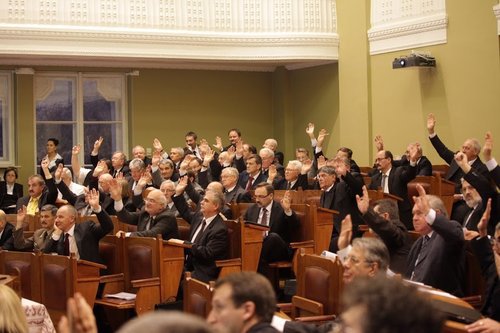Several important topics were discussed throughout the mid-November Synod meeting of the Reformed Church in Hungary. The Synod approached this meeting with a focus directed toward a time of reflection and reinterpretation of its mission.
A report was given on the activities of the Eco-Congregation Committee including the establishment of a Board and promotion of the Eco-Congregation at church events, and additionally, a draft of the committee's 2013 Plan. The Synod passed a resolution accepting the new translation of the Heidelberg Catechism as the official confession translation in the Hungarian Reformed Church, as well as a modification regarding the disciplinary action of the RCH concerning pastoral divorce. A description was given of the Internet tool, FAQ (Frequently Asked Questions), that will be implemented on the RCH website. The Synod then voted and approved thelist of questions entitled "Reformed A-Z" that will be used to aid visitors of the site who are not familiar with Reformed practices.
Among these topics was a report on the 2013 Csillagpont (Starpoint) youth festival. This is an event designed to bring youth together from the Carpathian Basin, as well as international representatives from partner churches, in order to discuss different issues and pressures challenging Christian youth today. The upcoming festival will be held in Mezőtúr and the theme will focus on the question of Identity.
Furthermore, there was a proposal concerning confirmation and baptism, presented to the Synod by the Confirmation Committee. The proposal focused on sociological research describing the trend of young people committing to confirmation and baptism but then, after completing the rites, not fully participating in the life of the church. The committee has employed a survey examining the opinions of youth, pastors and confirmation leaders in hopes of discovering new ways to interest and involve youth in their church community.
The Synod also passed a resolution accepting the new translation of the Heidelberg Catechism as the official confession translation uniformly used in the Hungarian Reformed Church (HRC). The proposal for a new translation was submitted in June during the Common Synod of the General Convent of the HRC. The next Common Synod is scheduled for June 2013 and its agenda centers on the 450th anniversary of the Heildelberg Catechism as well as the official adoption of its new translation.
Finally, the newly formed Church Revision Committee (CRC) was affirmed by the Synod and presented its preliminary report regarding the current structure of the church, status of local congregations as well as future steps to take in the renewal and revision process of the RCH. The Synod also passed a resolution supporting the 2013 launch of a sociological research plan that will concentrate on today's church. The CRC will conduct research on data within the church and the church's various fields of service. "Such research," as it was stated in the proposal, "could influence the direction and emphasis, and thus enhance the service of the church."

As the RCH looked to the future, it also took a moment to commemorate the service of Laszló Soós, former Synod reporter, and to remember the life of Miklós Jakab. Bishop Bölcskei shared moving words about both men in his opening remarks to the Synod on Thursday morning.
As always the Synod looks to God as it plans for another year of service in the Carpathian Basin. A list of guiding principles was drafted with the biblical focus from 2 Corinthians 5: 9-20. Paul's message, "Ambassadors for Christ" defines the church's mission direction in 2013. The Roma Strategy continues to be the main mission priority of the RCH. Next year, the RCH celebrates the anniversary of the Heidelberg Catechism as well as unity in reconciled diversity with the 40th jubilee of the Leuenberg Agreement. During this time, the church must take a meaningful look at what it means to be a confessing church in an ever-changing secular society. Lastly, the church is preparing for participation in the Assembly of the Conference of European Churches, which will be held in Budapest in July 2013, as well as next year’s most important event for the global Christian community, the World Council of Churches’ General Assembly in November. These topics are the focal point of the Synod Working Plan, which will serve as a tool to maintain the RCH's purpose of becoming "Ambassadors for Christ."
Amy Lester